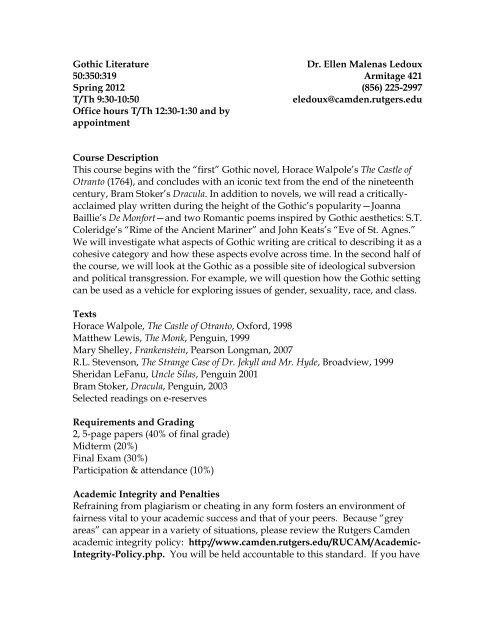Gothic Literature - Ellen Malenas Ledoux
Gothic Literature - Ellen Malenas Ledoux
Gothic Literature - Ellen Malenas Ledoux
You also want an ePaper? Increase the reach of your titles
YUMPU automatically turns print PDFs into web optimized ePapers that Google loves.
<strong>Gothic</strong> <strong>Literature</strong> Dr. <strong>Ellen</strong> <strong>Malenas</strong> <strong>Ledoux</strong><br />
50:350:319 Armitage 421<br />
Spring 2012 (856) 225-2997<br />
T/Th 9:30-10:50 eledoux@camden.rutgers.edu<br />
Office hours T/Th 12:30-1:30 and by<br />
appointment<br />
Course Description<br />
This course begins with the “first” <strong>Gothic</strong> novel, Horace Walpole’s The Castle of<br />
Otranto (1764), and concludes with an iconic text from the end of the nineteenth<br />
century, Bram Stoker’s Dracula. In addition to novels, we will read a criticallyacclaimed<br />
play written during the height of the <strong>Gothic</strong>’s popularity—Joanna<br />
Baillie’s De Monfort—and two Romantic poems inspired by <strong>Gothic</strong> aesthetics: S.T.<br />
Coleridge’s “Rime of the Ancient Mariner” and John Keats’s “Eve of St. Agnes.”<br />
We will investigate what aspects of <strong>Gothic</strong> writing are critical to describing it as a<br />
cohesive category and how these aspects evolve across time. In the second half of<br />
the course, we will look at the <strong>Gothic</strong> as a possible site of ideological subversion<br />
and political transgression. For example, we will question how the <strong>Gothic</strong> setting<br />
can be used as a vehicle for exploring issues of gender, sexuality, race, and class.<br />
Texts<br />
Horace Walpole, The Castle of Otranto, Oxford, 1998<br />
Matthew Lewis, The Monk, Penguin, 1999<br />
Mary Shelley, Frankenstein, Pearson Longman, 2007<br />
R.L. Stevenson, The Strange Case of Dr. Jekyll and Mr. Hyde, Broadview, 1999<br />
Sheridan LeFanu, Uncle Silas, Penguin 2001<br />
Bram Stoker, Dracula, Penguin, 2003<br />
Selected readings on e-reserves<br />
Requirements and Grading<br />
2, 5-page papers (40% of final grade)<br />
Midterm (20%)<br />
Final Exam (30%)<br />
Participation & attendance (10%)<br />
Academic Integrity and Penalties<br />
Refraining from plagiarism or cheating in any form fosters an environment of<br />
fairness vital to your academic success and that of your peers. Because “grey<br />
areas” can appear in a variety of situations, please review the Rutgers Camden<br />
academic integrity policy: http://www.camden.rutgers.edu/RUCAM/Academic-<br />
Integrity-Policy.php. You will be held accountable to this standard. If you have
any questions about citations, group work, or exam preparation, please do not<br />
hesitate to contact me.<br />
Late papers are subject to a reduction of 1/3 of a letter grade for each calendar day<br />
past the due date. For example, if the paper is due Monday and the student<br />
turns it in on Tuesday, the paper that would have been an A will now earn an A-.<br />
On Wednesday the grade will become a B+, on Thursday a B, and so on.<br />
Being repeatedly absent from class (more than two times over the course of the<br />
semester) will seriously affect your participation grade. To receive an “A” for the<br />
participation portion, you must be both present and actively engaged with the<br />
class during discussion. I define “active engagement” as the following:<br />
answering and/or asking questions, responding to your classmates’ ideas, and<br />
volunteering to read passages or to perform a scene.<br />
Assignments<br />
T 01.17.12 Introduction to <strong>Gothic</strong> Writing<br />
Th 01.19.12 Jerrold Hogle, “Introduction: the <strong>Gothic</strong> in Western Culture”<br />
(e-reserves)<br />
T 01.24.12 Horace Walpole, The Castle of Otranto, editor’s<br />
“Introduction” & chapter 1-3 (pp. vii-79)<br />
Th 01.26.12 The Castle of Otranto, chapters 4 & 5 (pp. 80-115)<br />
T 01.31.12 Matthew Lewis, The Monk, “Introduction” & chapters 1-3<br />
(pp. vii-112)<br />
Th 02.02.12 The Monk, chapter 4 & 5 (pp. 113-192)<br />
T 02.07.12 The Monk, chapters 6-9 (pp. 193-295)<br />
Th 02.09.12 The Monk, chapters 10-12 (pp. 296-377)<br />
T 02.14.12 Joanna Baillie, De Monfort (e-reserves), acts 1-3 (pp. 231-289)<br />
Th 02.16.12 De Monfort, acts 4 &5 (pp. 289-314)<br />
T 02.21.12 PAPER 1 DUE; John Keats, “The Eve of St. Agnes”<br />
(e-reserves)<br />
Th 02.23.12 “Introduction” to Frankenstein (pp. xvii-xxii) and S.T.<br />
Coleridge, “Rime of the Ancient Mariner”(e-reserves)<br />
T 02.28.12 Mary Shelley, Frankenstein, vol. 1 (pp. 5-69)<br />
Th 03.01.12 Frankenstein, vol. 2 (pp. 69-121)<br />
T 03.06.12 Frankenstein, vol. 3 (pp. 121-186)
Th 03.08.12 MIDTERM EXAM<br />
T 03.13.12 SPRING RECESS<br />
Th 03.15.12 SPRING RECESS<br />
T 03.20.12 Sheridan LeFanu, Uncle Silas, volume 1 (pp. 1-154)<br />
Th 03.22.12 NO CLASS 1<br />
T 03.27.12 Uncle Silas, volume 2, chs. 1-19 (pp. 155-297)<br />
Th 03.29.12 Uncle Silas, volume 3, chs. 1-10 (pp. 298-374)<br />
T 04.03.12 Uncle Silas, volume 3, chs. 11-21 (pp. 375-444)<br />
Th 04.05.12 Jekyll and Hyde, “Introduction” & up to “Search for Mr.<br />
Hyde” (pp. 11-70)<br />
T 04.10.12 Jekyll and Hyde, to conclusion (pp. 71-93)<br />
Th 04.12.12 Bram Stoker, Dracula, “Introduction” & up to chapter<br />
16 (p. 71)<br />
T 04.17.12 Dracula, chs. 7-13 (pp. 72-191)<br />
Th 04.19.12 Dracula, chs. 14-17 (pp. 192-247)<br />
T 04.24.12 Dracula, to conclusion<br />
Th 04.26.12 PAPER 2 DUE; Final exam review<br />
FINAL EXAM MONDAY MAY 7, 2012 9AM-12PM<br />
1 I’ll be giving a conference paper at the Interdisciplinary Nineteenth-Century Studies Conference this day.<br />
Please consider using this time to read ahead; substantial reading is due the following class period.


